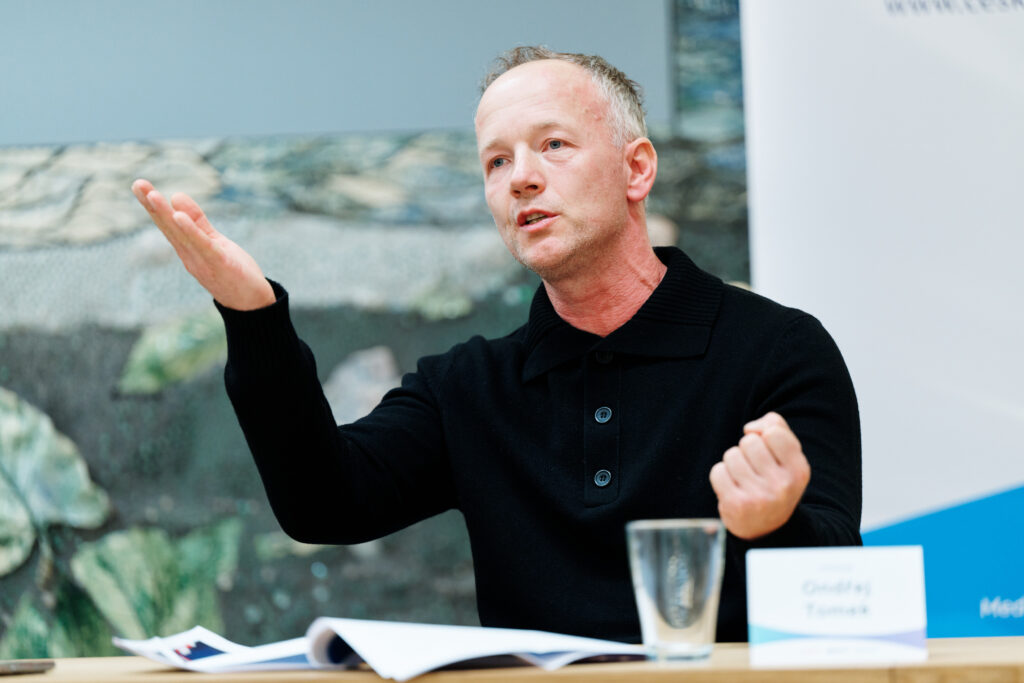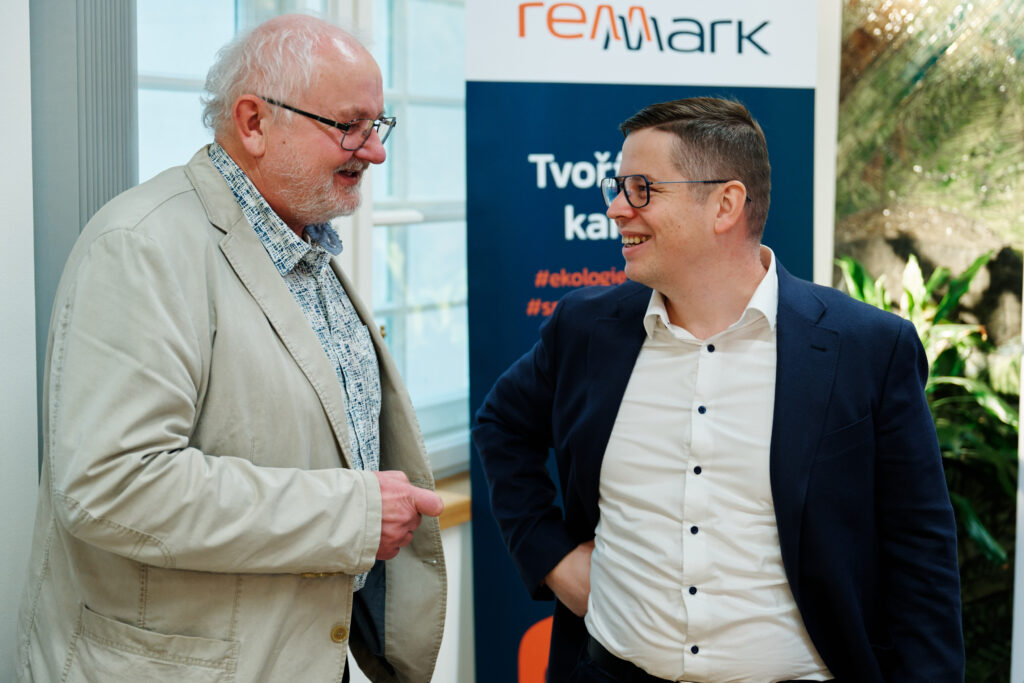
The education sytem for the digital economy needs to change, says Deputy Prime Minister Bartoš
The education sytem for the digital economy needs to change, says Deputy Prime Minister Bartoš
We present you with an article by Ekonomický deník, reflecting on the symposium Digitisation challenges – the path to digital excellence in the digital revolution. This event was co-organised by the AAVIT cluster as part of its activities and brought a meaningful discussion with interesting guests.
A quarter of the new European funds to support applied research and development in the IT industry, a stronger capital market, a systemic environment and targeting the training of professionals are the main building blocks for a more effective development of the digital economy and a better perspective of the Czech Republic in the global competition, think the participants of the panel discussion of the Economic Journal’s symposium Digitalisation challenges – the path to digital excellence in the digital revolution. “If we don’t educate people here and offer them an adequate environment for their realisation, they will leave to work for IT companies elsewhere in Europe, or to the United States if their ecosystem is better,” warned Deputy Prime Minister and Minister for Regional Development Ivan Bartos (Pirates).
n the short term, he said, specific programmes to increase skills could help. In the long term, however, a change in the education system is needed. According to the Minister for Regional Development, natural hubs, where know-how and business are connected, play an important role in the world of digitisation. These can be educational institutions, such as secondary schools.
Bartoš considers the biggest deficit to be the fact that we do not even have current people of working age trained in the skills that are needed. Moreover, according to the survey, up to 80 percent of working-age people do not feel the need to be educated during their working career.
“The race to digitalisation is global and European countries are investing in it. I think the biggest deficit is a lack of understanding of the knowledge transfer system. We are also still failing from a venture capital perspective to respond to the needs from the outside. If we want the ecosystem to work, it’s about synergy and meeting each other’s needs.” As Bartos also pointed out, funding has to come from the outside. “Not even the European Union will catch up with its loans,” he added. According to him, this is also shown by the map of investments in the field of research, where, for example, private capital is predominant in the field of quantum.
During the panel discussion, it was said that although the ICT sector is developing and dynamic in Europe, the data in international competition shows that it is lagging and losing competitiveness. Over the past decade, the share of global ICT sector revenue in Europe has fallen from 21 percent to 11 percent. What do the speakers believe is the cause?
According to Bartos, part of the reason may be that Europe’s starting position is not good in global comparison. “Europe has historically been very industrial. While somewhere they talked about the information society and the information revolution, here in the 1980s in some parts of the Czech Republic they talked about: you are a miner, you mine coal and you push it forward.” Moreover, according to the Deputy Prime Minister, the European environment is very protective for digitalization, and the regulatory environment of the economic market and the setting of legislative systems also has an influence.
“People joke that China has AI, America has AI and we have the AI Act. Everybody knows that Europe is lagging behind and they are trying to find ways to accelerate at the European level. In the Czech Republic, we are mediocre,” Bartoš said. He added that there will have to be a much bigger sprint than now. The energy crisis, for example, could also be a brake on building datacentres due to the high energy intensity, Bartoš said.
Tomek: Europe is too politicized
Ondřej Tomek, an entrepreneur and investor, sees the reasons behind this lies in “the extremely high over-politicisation of the European Union and the naivety of some politicians who think they know what they are doing”. The point of the technology sector, he says, is finance, brain power and enthusiasm. “But money comes first.” Over the last 20 years, Tomek says, there has been a dramatic change in the way the growth industry is financed, with Europe using bank loans to a large extent, and the US using the capital market, and then not having to worry so much about interest rates, for example.
Most of today’s digital titans, Tomek says, were generated by the internet fever known as the “dot-com bubble”, which lasted from 1996 to 2001, when internet use increased massively. “Those companies have roughly eight times the capitalisation of European companies,” he noted. But Tomek said the European market is influenced by other things than capital, such as the openness of the market itself or the language barrier. But the capital market is the main factor, he said. In his opinion, its greater development in Europe is hampered by the over-politicisation and incompetence of European politics.
The Czech Republic in particular is undercapitalised, according to Tomek. This is also reflected in the fact that it is difficult to find finance when it is necessary to pay for a large sophisticated project. “For example, Tesla or Facebook could not be created in Europe or in the Czech Republic.”
Another problem is the rate of employment in startups, which Tomek says is 10 percent in the United States, five percent in Israel, the UK has two percent and there is no data for the Czech Republic, but an educated guess is that it is 0.5 percent. This is a segment where investment capital expects an average annual growth of 25 per cent.
Tomek said that what could also help is a better functioning employee shareholding system and protection of minority shareholder rights.
It was also noted in the debate that betting on an American-style developed capital market is not self-sustaining. The global rise of predatory Asian tech giants from China, South Korea, Japan and Taiwan has not been financed by a highly developed capital market. The state and the banking sector linked to it have played a major role.
Digital strategy, AI involvement
In the panel discussion, Jaromír Hanzal, Director of the Association for Applied Research in IT, highlighted examples from Spain and Poland. “They have a digital strategy that they are implementing, they have built a digital economy priority in the National Recovery Plan and they are supporting it through AI sandboxes.” And another example is Latvia. According to Hanzal, there you can see a much greater momentum in the growth of people working in startups in five years.
Where the Czech Republic is thriving, according to Hanzal, is in the area of exports. “The Czech Republic is the largest exporter of ICT services to Central and Eastern Europe.” He added that, for example, in terms of GDP growth, ICT in the Czech Republic is lagging behind compared to other countries.
Hanzal sees Czech plans to develop spin-offs within universities as not ambitious enough. In 2030, nine spin-offs per year should be created according to current plans, so there should be about 50 in total, but Austria will have 150 by then, according to Hanzal. He noted that many of them may not be digital, however. “They are tiny indicators and we don’t even have that ambition.”
Hanzal said the need would also be to make it easier to test new technologies. Not discussed is the issue of finance and making it easier to invest in companies at any stage. “From the Czech point of view, it is important to connect, not isolate and cooperate, because all projects are becoming international.”
Petr Filipi, director of the Ministry of Industry and Trade’s Digitalisation and Internet Department, said it was important to communicate with the ICT sector. He said this helped also at a time when 14 billion was available for the development of the internet in the telecommunications sector. “We know what the mother of our economy is, but we also need sails to carry us further into Europe and the world,” he said. He added that the emphasis is on supporting progressive industries in the country and the numbers and trends are crystal clear.











